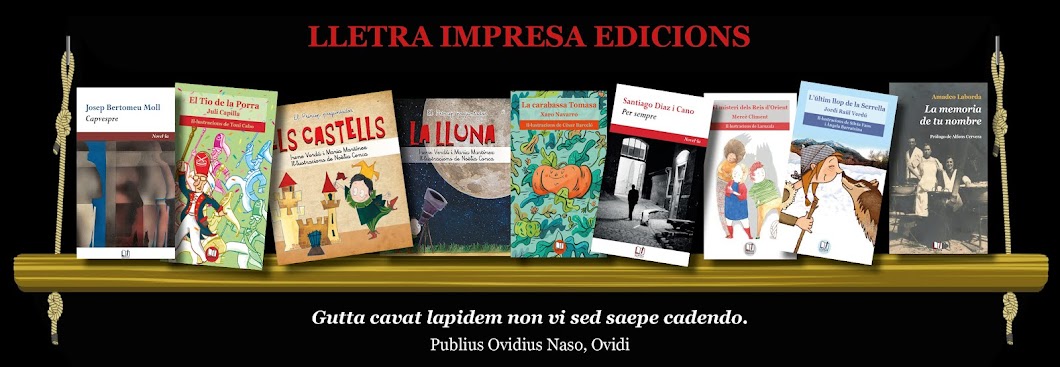Magnífica ressenya sobre Capvespre, de Josep Bertomeu Moll, del filòleg, traductor i escriptor Jorge Salavert, des d'Austràlia. Aquesta novel·la magnífica de l'amic Pep arriba ben lluny, i més que ho farà, n'estic cert. Gràcies, Jorge! Ací la teniu:
Josep Bertomeu Moll, Capvespre (Gandia: Lletra Impresa, 2016). 224 pages.
I was a rather naïve 11-year-old boy when Fascist dictator Franco died, yet I do have a few memories of the difficult years before his death, and particularly the profound changes that occurred in the years that followed. It could very well be argued that more than 40 years later, those political changes have turned out to be rather cosmetic in their nature. Spain has basically retained the political status quo resulting from the military coup in 1936, the ensuing Civil War and forty years of a dictatorial regime. It is a country where conservative elites and economic oligarchies exercise their unfettered power, where corruption unashamedly spreads to the top echelons of government. Unsurprisingly, though, a clear majority of voters continue to elect politicians whose decency is, to say the least, questionable. Go figure.
In those years, my home town, Valencia, was not the markedly touristic destination it seems to be today. Valencian life in the 1970s was rather different from the easy-going, festive city it is in 2016. Then there was fear in the streets, and news of the political repression elsewhere in the Spanish State would have been very discreetly commented on by people in the streets. One of my first memories associated with anything remotely political is of my paternal grandmother telling me not to speak our local language instead of Spanish when in public. I must have been about 5 or 6 years old.
This is the Valencia Capvespre (The Evening) is set in. Written in 1977, the author kept it hidden in a drawer for decades until Lletra Impresa, an enthusiastic publisher from Gandia, rescued the manuscript and took a gamble by printing it as their first volume in their fresh fiction collection. Unless there are more uncovered manuscripts of his, this might unfortunately turn out to be Bertomeu’s only published book, since he unexpectedly passed away just a couple of weeks ago.
A fragmentary narrative, Capvespre follows the lives of Lluís and Pilar, the two main characters, whose complicated, twisted, on-and-off relationship makes up the main plot of the novel. They are part of a wider circle of friends, university students who fight the regime hoping to achieve freedom, hoping to reach for their future, for their dreams at a time when Francoist repression had intensified its brutal force. Moreover, Bertomeu employs different narrative points of view, providing noteworthy contrasts between the various characters about the same events.
The terrible mishaps associated with mandatory military service, the patently injurious conditions for young females within what was a creepily Catholic society, the lively nights of jazz music and cheap booze in well-known bars of the different barrios of Valencia, the ground-breaking literature that was landing at Spanish bookshops in those years (Neruda, César Vallejo, Cortázar, Arguedas, García Márquez, Cabrera Infante, among others), the first sexual experiences of very young men and women, the extremely risky business of joining the then illegal Communist Party … these are some of the situations and circumstances narrated by Lluís, or explained through letters by Pilar, Jordi, Sergi. Bertomeu succeeds in contriving a 1977 narrative that feels way before his time, and is at times more ‘contemporary’ than some novels written in recent years, both in its circular structure and its utterly compelling style.
Non-conformism was an essential part of the philosophy of the young people at the time. They would not abide by a State that repressed and coerced them. Gathering in the streets and plazas of Valencia (which Bertomeu cleverly identifies by using the Francoist names they had until the late 1970s) to distribute radical pamphlets or marching in protest, the students regularly had to run away from riot police, or occasionally clashed with Fascist gangs at the Faculty.
 |
| For anyone arriving in Valencia by train, Plaza del Caudillo (wash your mouth, boy!) was an unavoidable passageway towards the bars in the older parts of the city. Today it is known as Plaça de l"Ajuntament. |
In Capvespre, some of Lluís’s friends are arrested by Franco’s Secret Police and sent to jail, where they languish for months or even years, found guilty in trials run by ludicrous judges. Their crime? Wishing freedom for their peers and themselves.
Capvespre is a welcome and necessary reminder of the struggle for dignity a whole generation of Valencians engaged in. It should also help us to focus on the fact that 40 years later, younger generations of Valencians, let alone Spaniards, time and again see how their hopes and their dreams are smashed by inept governments that continue to underpin a decrepit, dishonest, fraudulent political system.
Apart from a few well-accomplished historical recreations such as Silvestre Vilaplana’s L’estany de foc, the city of Valencia had never really been the protagonist of a book. It is a pleasant surprise to see how the city comes alive in Bertomeu’s words, in his sharp-eyed descriptions. How unfortunate it is that Bertomeu is no longer alive to write a sequel to Capvespre.
2 de novembre de 2016







